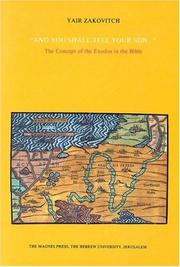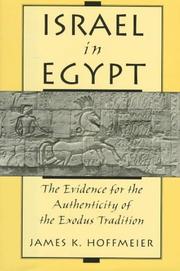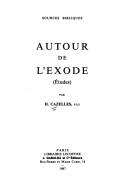| Listing 1 - 10 of 33 | << page >> |
Sort by
|
Book
ISBN: 3447025689 9783447025683 Year: 1985 Volume: 9 Publisher: Wiesbaden : Harrassowitz,
Abstract | Keywords | Export | Availability | Bookmark
 Loading...
Loading...Choose an application
- Reference Manager
- EndNote
- RefWorks (Direct export to RefWorks)
Exodus, The --- Bible --- Criticism, Redaction --- Exodus (Biblical event) --- Jews --- Exodus --- History --- Bible. --- Criticism, Redaction.

ISBN: 9652237809 9789652237804 Year: 1991 Publisher: Jerusalem Magnes
Abstract | Keywords | Export | Availability | Bookmark
 Loading...
Loading...Choose an application
- Reference Manager
- EndNote
- RefWorks (Direct export to RefWorks)
222.3 --- Exodus. Leviticus. Numeri --- Exodus, The. --- Exodus, The --- Exodus (Biblical event) --- Jews --- Exodus --- History
Book
ISBN: 9789004209190 9004209190 Year: 2011 Volume: 61 Publisher: Leiden Brill
Abstract | Keywords | Export | Availability | Bookmark
 Loading...
Loading...Choose an application
- Reference Manager
- EndNote
- RefWorks (Direct export to RefWorks)
Exodus, The --- 222.3 --- Exodus (Biblical event) --- Jews --- Exodus. Leviticus. Numeri --- Exodus --- History --- Bible. --- Biblia --- Bible --- Criticism, interpretation, etc. --- Reader-response criticism.
Book
ISBN: 1283280868 9786613280862 9004216073 9789004216075 9789004209190 9004209190 Year: 2012 Publisher: Leiden Boston Brill
Abstract | Keywords | Export | Availability | Bookmark
 Loading...
Loading...Choose an application
- Reference Manager
- EndNote
- RefWorks (Direct export to RefWorks)
The wilderness narratives Ex 15:22–17:7 and Num 11:1-20:13 are shaped by striking repetitions as well as breaks in style and content. This study describes the continued interaction between the various text signals and the ‘co-operative reader’ who attempts to achieve a coherent reading. This type of an ideal reader alludes to the concepts of reception theorists W. Iser and U. Eco and is applied here for the benefit of the narratives of the Old Testament. A second main part 4demonstrates systematically the narrative tools of guiding the reader within the wilderness narratives. This approach emphasises the dynamic character of the interpretation of the text. In this way, the author re-evaluates for example text structures, blanks or duplicates by weighing up their significance and relevance for the reading process. Die Wüstenerzählungen Ex. 15:22-17:7 und Num. 11:1-20:13 sind von markanten Wiederholungen wie auch von stilistischen und inhaltlichen Brüchen geprägt. In der vorliegenden Untersuchung wird fortlaufend die Interaktion der unterschiedlichen Textsignale mit einem `kooperierenden Leser´ beschrieben, der trotz aller Lesestörungen bemüht ist, eine kohärente Lektüre zu erzielen. Dieser Idealtypus eines Lesers lehnt sich an die rezeptionsästhetischen Entwürfe von W. Iser und U. Eco an und soll für narrative Texte des Alten Testamentes fruchtbar gemacht werden. In einem weiteren Hauptteil werden systematisch die textlichen Mittel der Leserlenkung innerhalb der Wüstenerzählungen dargestellt. Mit dieser Herangehensweise wird der dynamische Charakter einer Textinterpretation betont. So werden beispielsweise Textstrukturen, Leerstellen oder Dubletten neu bewertet, indem ihre Signifikanz und Relevanz für einen Leseprozess abgewogen werden.
Exodus, The. --- RELIGION / Biblical Studies / Old Testament. --- Exodus (Biblical event) --- Jews --- Exodus --- History --- Bible. --- Bible --- Reader-response criticism. --- Criticism, interpretation, etc.
Book
ISBN: 344509134X 9783445091345 Year: 1993 Volume: 78 Publisher: Frankfurt am Main Hain
Abstract | Keywords | Export | Availability | Bookmark
 Loading...
Loading...Choose an application
- Reference Manager
- EndNote
- RefWorks (Direct export to RefWorks)
Exodus, The. --- Yam suf (The Hebrew phrase) --- 222.3 --- Exodus, The --- #GROL:SEMI-22<08> Bonn 78 --- Yam Sup (The Hebrew phrase) --- Hebrew language --- Exodus (Biblical event) --- Jews --- Exodus. Leviticus. Numeri --- Terms and phrases --- Exodus --- History

ISBN: 0195097157 019513088X 0199853401 058534647X 019976123X 1283113287 9786613113283 9780195097153 Year: 1997 Publisher: New York Oxford university press
Abstract | Keywords | Export | Availability | Bookmark
 Loading...
Loading...Choose an application
- Reference Manager
- EndNote
- RefWorks (Direct export to RefWorks)
Exodus, The --- Egyptian literature --- Relation to the Old Testament --- Bible. --- Extra-canonical parallels. --- 222.3 --- Exodus. Leviticus. Numeri --- Exodus (Biblical event) --- Jews --- Exodus --- History --- Egyptian literature - Relation to the Old Testament
Book
ISBN: 9781463202712 Year: 2014 Publisher: Piscataway Gorgias Press
Abstract | Keywords | Export | Availability | Bookmark
 Loading...
Loading...Choose an application
- Reference Manager
- EndNote
- RefWorks (Direct export to RefWorks)
The divine warrior is an important motif in the Old Testament, leading many to study profitably the motif in its most prominent manifestations in poetic texts. This study builds on that foundation by examining the divine warrior in detail in the exodus narrative to construct a broader picture of the motif in the Old Testament. The heart of the work focuses on the exodus narrative. Many aspects of YHWH’s actions in the narrative, such as the terminology, his nature weapons, his psychological attacks, the presence of supernatural envoys and disease, and his harmonious relationship with his people identify YHWH’s role as that of a divine warrior. Several other elements match the description of the motif of the divine warrior elsewhere in the Old Testament, but are described in more detail in the narrative than in the briefer poetic divine warrior texts. The exodus narrative also expands the martial aspects of the divine warrior, as it includes a broader selection of nature weapons, psychological attacks directed at Pharaoh, the employment of cosmic enemies against Pharaoh, and assaults on the Egyptians gods. Finally, a possible connection between the divine control of Pharaoh (focusing in particular on the hardening of his heart) and the motif of the divine warrior is explored.
Exodus, The. --- War --- God (Christianity) --- 222.3 --- Attributes of God --- Exodus (Biblical event) --- Jews --- Biblical teaching. --- Attributes. --- Exodus. Leviticus. Numeri --- Exodus --- Bible. --- Criticism, interpretation, etc. --- Exodus, The --- Appropriation (Christian theology) --- Biblical teaching --- Attributes --- History
Book

ISBN: 1575064308 9781575064307 9781575064291 1575064294 Year: 2021 Publisher: University Park, PA
Abstract | Keywords | Export | Availability | Bookmark
 Loading...
Loading...Choose an application
- Reference Manager
- EndNote
- RefWorks (Direct export to RefWorks)
The Hebrew Scriptures consider the exodus from Egypt to be Israel’s formative and foundational event. Indeed, the Bible offers no other explanation for Israel’s origin as a people. It is also true that no contemporary record regarding a man named Moses or the Israelites generally, either living in or leaving Egypt has been found. Hence, many biblical scholars and archaeologists take a skeptical attitude, dismissing the exodus from the realm of history. However, the contributors to this volume are convinced that there is an alternative, more positive approach. Using textual and archaeological materials from the ancient Near East in a comparative way, in conjunction with the Torah’s narratives and with other biblical texts, the contributors to this volume (specialists in ancient Egypt, ancient Near Eastern culture and history, and biblical studies) maintain that the reports in the Hebrew Bible should not be cavalierly dismissed for ideological reasons but, rather, should be deemed to contain authentic memories.
Exodus, The --- Jews --- Hebrews --- Israelites --- Jewish people --- Jewry --- Judaic people --- Judaists --- Ethnology --- Religious adherents --- Semites --- Judaism --- Exodus (Biblical event) --- History --- Exodus --- Jews. --- Exodus, The. --- Juifs --- Exode --- Histoire --- Jewish question
Book
ISBN: 1850754187 9781850754183 Year: 1993 Volume: 85 Publisher: Sheffield JSOT
Abstract | Keywords | Export | Availability | Bookmark
 Loading...
Loading...Choose an application
- Reference Manager
- EndNote
- RefWorks (Direct export to RefWorks)
Covenant theology --- Exodus, The --- History of doctrines. --- 227.1*2 --- -Exodus, The --- -Exodus (Biblical event) --- Jews --- Covenant of grace --- Covenant of works --- Covenants (Theology) --- Federal theology --- Theology, Covenant --- Theology, Federal --- Covenants --- Theology, Doctrinal --- Brieven van Paulus aan de Corinthiërs --- History of doctrines --- Exodus --- History --- Religious aspects --- Congregational churches --- Presbyterian Church --- Puritans --- Reformed Church --- -Brieven van Paulus aan de Corinthiërs --- 227.1*2 Brieven van Paulus aan de Corinthiërs --- -227.1*2 Brieven van Paulus aan de Corinthiërs --- Exodus (Biblical event) --- Bible. --- Criticism, interpretation, etc. --- Covenant theology - History of doctrines. --- Exodus, The - History of doctrines.

ISBN: 2850210242 9782850210242 Year: 1987 Publisher: Paris Gabalda
Abstract | Keywords | Export | Availability | Bookmark
 Loading...
Loading...Choose an application
- Reference Manager
- EndNote
- RefWorks (Direct export to RefWorks)
Exodus, The --- Bible --- Criticism, interpretation, etc --- 222.3 --- #GROL:SEMI-22<08> Sour --- Exodus (Biblical event) --- Jews --- Exodus. Leviticus. Numeri --- Exodus --- History --- Bible. --- Antico Testamento --- Hebrew Bible --- Hebrew Scriptures --- Kitve-ḳodesh --- Miḳra --- Old Testament --- Palaia Diathēkē --- Pentateuch, Prophets, and Hagiographa --- Sean-Tiomna --- Stary Testament --- Tanakh --- Tawrāt --- Torah, Neviʼim, Ketuvim --- Torah, Neviʼim u-Khetuvim --- Velho Testamento --- Criticism, interpretation, etc.
| Listing 1 - 10 of 33 | << page >> |
Sort by
|

 Search
Search Feedback
Feedback About UniCat
About UniCat  Help
Help News
News